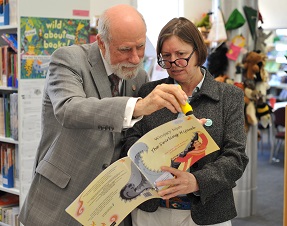Modern foreign languages in the primary and secondary school: Teaching the new National Curriculum
For the second year, we are delighted to be able to offer free and extensive CPD for primary and secondary school language teachers through funding from the government, co-delivered by experienced local teachers and University tutors.
The programme will begin with a whole day of input and activities, followed by monthly twilight sessions and will end with a half-day event. French language upskilling sessions will be provided for primary teachers in addition, each month.
Government funding allows us to be able to make a substantial contribution to supply costs for teachers attending the first and last event plus some twilight sessions.
The programme will be of benefit for all those teaching languages, especially colleagues leading languages provision in schools, as well as those new to delivering primary languages. The language of focus for primary colleagues will be French; for secondary colleagues, sessions will include examples in French, German and Spanish. Much of the content for secondary colleagues will be very relevant for the new GCSE specifications, especially with regard to spontaneous speaking and literary texts.
Sessions will include:
- Creating a joined up KS2-3 curriculum for languages
- Developing core oral skills, including accurate pronunciation and spontaneous oral interaction
- Literacy skills in the foreign language –including reading for comprehension, appreciation and vocabulary development
- Developing grammatical competence across Key Stage 2 and 3
- Developing learners’ listening skills
- Assessment
- Primary-secondary transition
As well as gaining a wealth of practical ideas, participants on the programme will also enhance their understanding of the principles that underpin effective language learning.
Last year there was a very high demand for places so please book early at: http://store.rdg.ac/UoR-ModernForeignLanguagesinthePrimaryandSecondarySchool15
 Session 1
Session 1
Whole day, Friday 9 October, 09.30-15.30, Institute of Education: The new National Curriculum across Key Stages 2-3 and principles of effective teaching and learning; developing learners’ listening skills; assessment and evaluation; transition issues
Twilight Sessions – All held at the University of Reading, Institute of Education, London Road Campus
Session 2 (Speaking): Wednesday 4 November 2015, 16.30-18.30
Session 3 (Speaking): Thursday 3 December 2015, 16.30-18.30
Session 4 (Reading): Wednesday 13 January 2016, 16.30-18.30,
Session 5 (Reading/writing): Thursday 4 February 2016,16.30-18.30,
Session 6 (Grammar/writing): Wednesday 2 March 2016, 16.30-18.30,
Session 7 (Sharing practice; transition): Half day, Wednesday 23 March, 13.30-16.30
If you are unable to attend the first whole day session, you will still be very welcome to come to the twilights. We also welcome different teachers from the same school for different sessions, i.e. attendance can be ‘shared’ within a school, so that ideas can be cascaded across colleagues.
Additional French language tuition will be offered on the following dates for primary teachers, with all sessions held at the University. There will be two levels of classes, one for beginners with little or no knowledge of French, one for ‘improvers’ or Intermediate learners
| Beginners | Intermediate/Improvers |
| Tuesday 20 October, 17.00-19.00 | Thursday 22 October, 17.00-19.00 |
| Tuesday 24 November, 17.00-19.00 | Thursday 26 November, 17.00-19.00 |
| Tuesday 8 December, 17.00-19.00 | Thursday 10 December, 17.00-19.00 |
| Tuesday 19 January, 17.00-19.00 | Thursday 21 January, 17.00-19.00 |
| Tuesday mid-February, 17.00-19.00 (date TBC) | Thursday mid-February, 17.00-19.00 (date TBC) |
We will pay for one day’s supply cover for teachers who attend the first and last event plus some twilight sessions, with schools asked to fund the remaining half-day. There are no further costs for the CPD. Further details will be emailed out with joining instructions before the first event.
For further information about any aspect of the CPD, please contact: education-events@reading.ac.uk or phone 0118 378 2612
This CPD is being delivered as a consortium led by the University of Reading and involves the following partners:
- Bartholomew School, Eynsham
- Fair Oak Junior School
- Keep Hatch Primary School
- Oxford University Department of Education
- Radstock Primary School
- The Willink School, Burghfield Common
- Wellington College Teaching School Partnership
- Wokingham Secondary Federation







